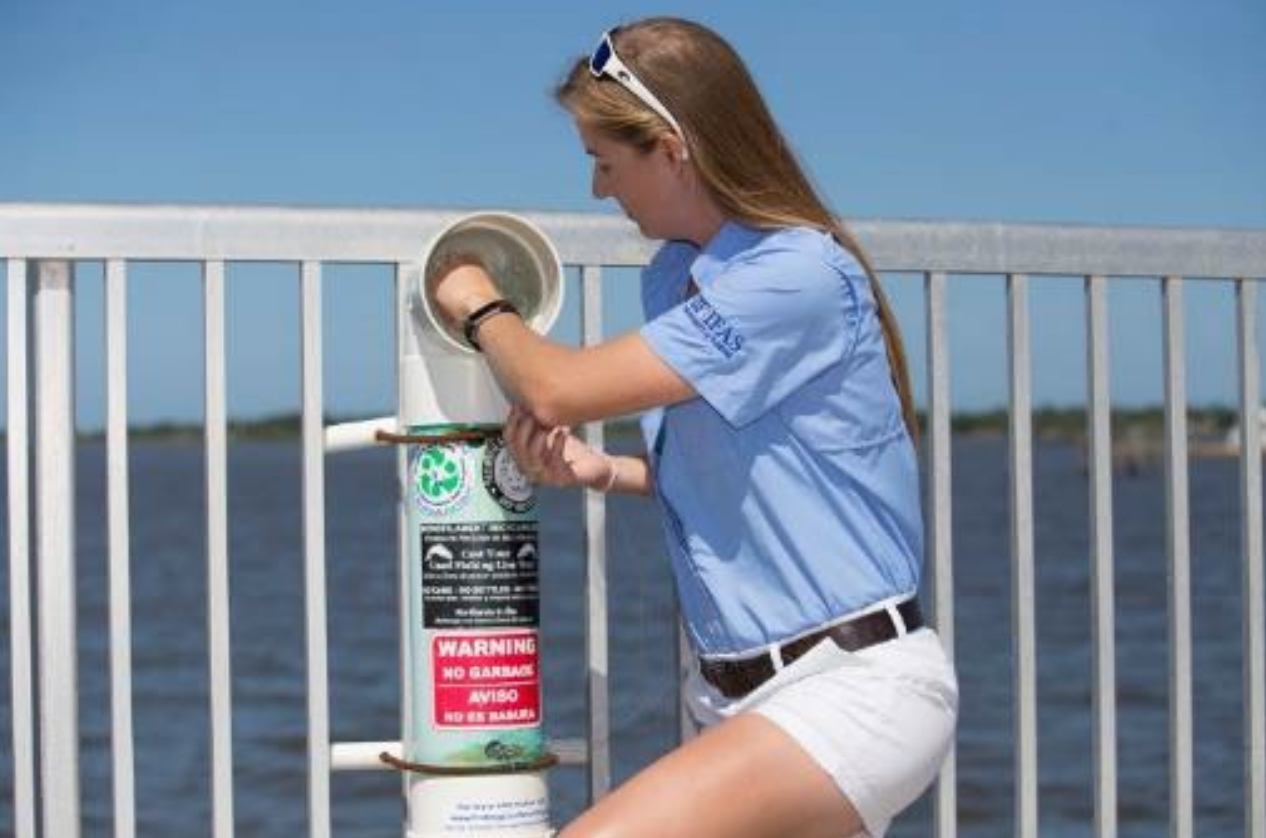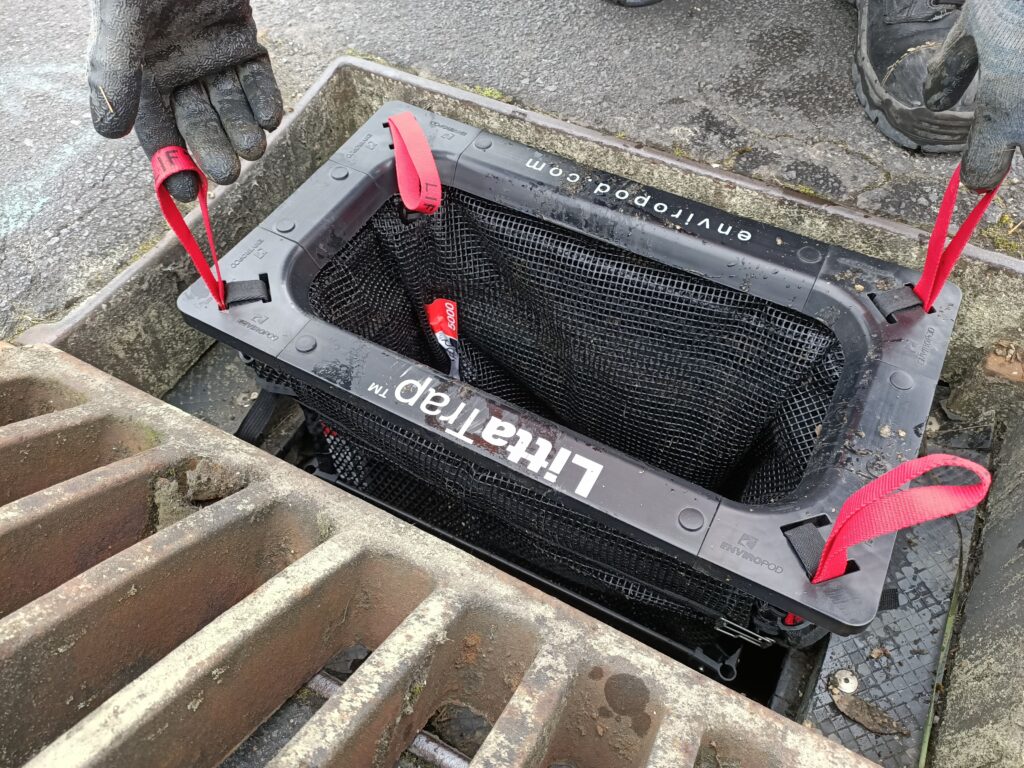Single-use plastics and marine debris have circulated in our oceans and media headlines for decades. Each year, plastic waste enters our oceans at a rate of 11 million metric tons, threatening the vitality of aquatic and marine ecosystems.
Considering Florida’s rapid population growth and development on coastlines, communities along Florida’s Aquatic Preserves in the Big Bend and Nature Coast region of Florida’s Gulf Coast are leading an initiative to reduce marine litter and debris.

Savanna Barry places litter into monofilament collection device. Photo courtesy of UF/IFAS.
The National Oceanic and Atmospheric Administration Marine Debris Program recently granted $747,944 in funding to the University of Florida (UF) to prevent single-use plastics and litter from entering Florida’s Nature Coast Aquatic Preserve. This opportunity was funded through the Bipartisan Infrastructure Law.
The grant will enable UF to partner with the Florida Department of Environmental Protection’s (FDEP) Aquatic Preserve Program and Pasco County to reduce single-use items through Operation TRAP (Trash Reduction for Aquatic Preserves), a project focused on enhancing litter interception through capture devices, data collection, and community engagement.
“Interception devices have the potential to reduce environmental impacts of escaped plastic, reduce spending on active cleanups and pinpoint hotspots of litter entry so managers can focus efforts to address litter sources upstream,” said Savanna Barry, a regional specialized extension agent at the UF/IFAS Nature Coast Biological Station in Cedar Key.
The necessity for diverse mitigation approaches stems from the increase in marine debris and plastics from land-based sources; approximately 80% of marine debris comes from storm drains, sewers, and litter near the coast.
This important program offers debris collection right at the drainage source – before trash reaches the coast and open waters.
Barret Doe, asssistant director of Pasco County Public Works
The Nature Coast Aquatic Preserve (NCAP), managed by FDEP, is the second-largest aquatic preserve in Florida, encompassing 800 square miles of coastal waters and 625 miles of shoreline.
“The preserve supports thriving ecosystems and wildlife, including sea turtles and manatees, and protects nearly 400,000 acres of seagrass. However, commercial and recreational activities from nearby developed areas cause significant impacts on aquatic preserves,” said Barret Doe, assistant director of Pasco County Public Works.
Pasco County, a rapidly urbanizing county with stormwater infrastructure directly adjacent to sensitive and relatively intact coastal systems of the NCAP, will serve as a priority area for Operation TRAP. The project plans to implement LittaTraps, Litter Booms, and monofilament collection devices to capture items commonly washed downstream through stormwater runoff and drainage systems.

LittaTrap device installed in a stormwater drain. Photo courtesy of EnviroPod.
- LittaTraps are similar to a pool skimmer! These litter interception devices are baskets that sit inside the stormwater drain and prevent trash and other debris carried by stormwater from entering the storm drain system systems. Per manufacturer’s guidelines, the baskets are recommended to be removed from drain systems and cleaned out at least four times per year. However, this project will aim to check and maintain the installed LittaTraps every four to six weeks to ensure that litter caught does not build up and to provide more frequent opportunities for data collection. Collected materials will be cataloged, sorted, and properly disposed of or recycled. The goal is to install at least 60 LittaTraps as part of Operation TRAP.
- Litter Booms are floating barriers designed to stretch across the canal and creek waterways to capture floating debris in slow-moving water, and prevent it from flowing into larger bodies of water. The goal is to install and maintain at least three Litter Booms.
- Monofilament collections are recycling containers installed at public water access points such as boat ramps and fishing piers. Several boat ramps and water access points in Pasco County currently need appropriate monofilament disposal vessels. Up to 20 new monofilament containers will be installed.
Pasco County will work alongside the University of Florida, Florida Sea Grant, and other county partners to compile data on debris types and amounts from all capture devices. Data will be shared through the project’s forthcoming website, education and outreach opportunities, K-12 public school programs, and a pop-up education station at select LittaTrap maintenance events.
“Devices will be installed in public areas that likely get quite a bit of foot traffic. We will install signage near several of the devices and when our staff are maintaining the devices, we will have many formal and informal opportunities for public education and engagement,” Barry said.
The results of Operation TRAP will serve as a case study that can inform how neighboring local governments decide to reduce litter in their waters. The pilot project will also occur in Cedar Key (Levy County), aiming to later expand into Citrus and Hernando counties.
“This important program offers debris collection right at the drainage source – before trash reaches the coast and open waters,” Doe said. “We plan to add more collection locations, and hope these efforts inspire and motivate other cities and counties to implement similar programs.”
The University of Florida (UF), Florida Sea Grant, and UF/IFAS Extension work closely with the Florida Department of Environmental Protection (FDEP) within the regional Aquatic Preserves of the Nature Coast. Funding from FDEP supports UF to carry out monitoring (including Project COAST) and other programs within the Nature Coast Aquatic Preserve (NCAP) under the guidance of Regional Manager Tim Jones and the Regional FDEP management team. NCAP is managed by FDEP’s Office of Resilience and Coastal Protection. The views, statements, findings, conclusions and recommendations expressed herein are those of the author and do not necessarily reflect the views of the State of Florida or any of their sub-agencies.